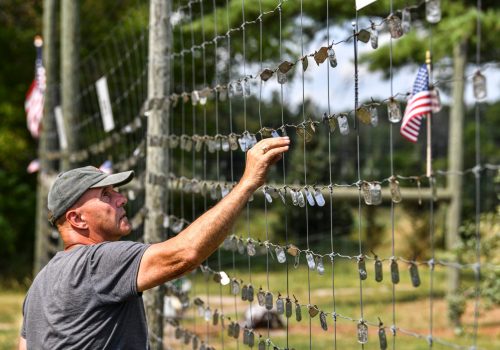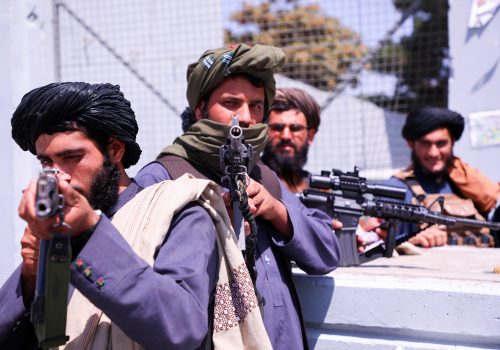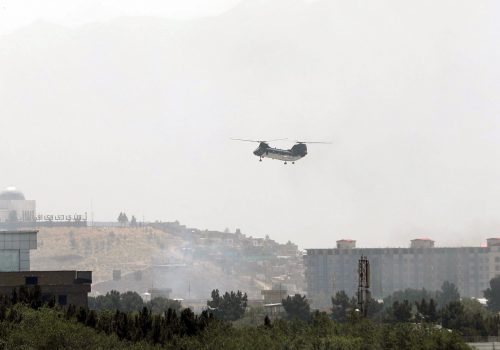Afghanistan veterans’ sacrifices were not made in vain
Veterans Day is about remembering.
I remember how, on a sunny morning in a school gymnasium in Pinehurst, North Carolina, I cried with the families of three US veterans who made the ultimate sacrifice in Afghanistan in the name of freedom and security. The families shared memories of their lost loved ones in order to keep their presence alive. The families told me about the veterans’ characters, qualities, and aspirations. One family told me that their son never met his newborn daughter, for whom he was so excitedly waiting. I cried with them, for them, and for the many thousands of Afghans who have been dying in the war every single day.
I shared how Afghanistan has changed since US intervention and how the veterans’ sacrifices had helped in not only rebuilding the country, but also restoring hope and trust in the future. That day, we found solace in consoling one another, knowing that we had more in common than we knew and reflecting on what all of these sacrifices meant.
Today, many ask whether keeping US troops in Afghanistan for more than twenty years was worth it.
For the bulk of the eight hundred thousand veterans who served in Afghanistan, this is a loaded question. It is not a decision and a policy for them: It is about the soldiers’ oath they took, the bonds they formed with the Afghan people, and the promises they made.
Since the collapse of the former government of Afghanistan, I have talked to numerous veterans and their families. I learned about those who went dark: those who have lost faith, those who feel guilty, and those who continue to seek assistance in coping with their mental health and emotional difficulties. Many still search for the meaning of their service as a critical segment of their careers which will, in many cases, cast a shadow over the rest of their lives.
These struggles are not unique to Afghanistan veterans. Between five hundred thousand and seven hundred thousand Vietnam War veterans confronted post-traumatic stress disorder upon their return home, and thousands more experienced other physical and mental challenges for months and years during their reintegration into society. Similarly, Brown University and Boston University jointly published a study indicating that more than thirty thousand active-duty personnel and veterans of the post-9/11 wars have died by suicide. After living in such proximity to warfare and violence, it becomes very difficult to reconcile that survival-mode lifestyle with daily life in the communities to which the veterans return.
On this Veterans Day, it is important to remember the significant achievements Afghans, Americans, and our allies made over the past twenty years. Afghanistan was more connected to the world than it ever had been. Its literacy rate reached historic heights, and Afghan women enjoyed freedoms and opportunities that they never did before.
Despite the recent loss of many of those gains in the country’s collapse, Afghanistan War veterans should take heart in remembering that the educated in Afghanistan cannot be uneducated, and the men who broke free from their own prejudices against women—and even carried young girls to school on their bikes—will not return to thinking that a woman’s place is in the kitchen. The young people who grew up with freedom will not surrender to oppression.
We the Afghans who worked with US service members realize that the war is not over for them, and it is certainly not over for us, especially for Afghan women. The end of war should result in a real and durable peace that brings justice, education, equality, and economic opportunities. For Afghanistan, that has yet to come.
But there is always something that we can do. For example, look to the example of Vietnamese people: After the Vietnam War, the Vietnamese diaspora played a key role in uplifting the Vietnamese economy. They promoted Vietnamese culture and values throughout the world and have, in the past fifty years, become one of the largest overseas diaspora communities, returning by the tens of thousands each year to invest and live in Vietnam.
Today, millions of Afghans at home and abroad are still carrying dreams and aspirations for a peaceful and prosperous Afghanistan. The seeds of change that US veterans helped to plant over the past twenty years in Afghanistan will continue to flourish. Change is a slow process—but it is always on the horizon.
One day, I hope that we will honor all veterans of the war in Afghanistan by celebrating the fruits of their contributions so far and those yet to come. Rather than shed tears, it will give us all a reason to smile.
Roya Rahmani is a senior advisor at the Atlantic Council’s South Asia Center. She also serves as a distinguished fellow at the Georgetown Institute for Women, Peace and Security, as well as a senior fellow for international security at the New America Foundation. She was the Afghan ambassador to the United States from 2018 to 2021.
Further reading
Wed, Aug 25, 2021
PTSD is an endless war for veterans. The news from Afghanistan is making it worse.
New Atlanticist By Kirsten Fontenrose
The realities of the Afghanistan withdrawal and its framing as a defeat put service members and veterans at risk for debilitating mental health problems and suicide.
Fri, Sep 10, 2021
Confronting the disaster left behind in Afghanistan
New Atlanticist By Mir Sadat
The United States screwed up the endgame in Afghanistan once again, but working with allies and private rescue efforts, there's time to make things right.
Tue, Aug 17, 2021
Vietnam’s lessons for the Afghanistan failure: Don’t count out US leadership just yet
New Atlanticist By Daniel Fried
What will the debacle in Afghanistan mean for US strategy in the world and for its friends and allies who are watching all of this with dismay? For that question, the answer may lie in the consequences of US failure in Vietnam.
Image: Soldiers from the 4th Battalion, 31st Infantry Regiment, 2nd Brigade Combat Team of the 10th Mountain Division take part in a welcome ceremony after returning home from deployment in Afghanistan, at Fort Drum, New York on September 6, 2021. Photo via REUTERS/Brendan McDermid.


